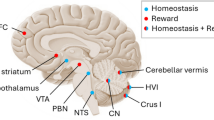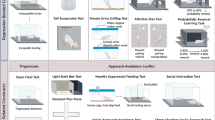Abstract
Lever-pressing behavior of two species of macaque, the rhesus macaque (M. mulatta) and the pigtail macaque (M. nemestrina) was maintained by intravenous injection of codeine, etorphine, or cocaine. Monkeys responded under a fixed-ratio 30 timeout 600 s schedule of drug injection during two daily experimental sessions. Drug-maintained behavior was studied under two access conditions. Under the first condition, selected doses of codeine or cocaine were available for ten consecutive sessions. Under the second condition, responding was maintained by 0.32 mg/kg codeine or 0.32 mg/kg cocaine, and saline and selected doses of codeine, etorphine, and cocaine were substituted during single experimental sessions. Performance varied with drug and injection dose, access condition, and macaque species. For all three drugs, response rate increased and then decreased as injection dose increased. Maximal rates were maintained by 0.10–0.32 mg/kg codeine, 0.0003–0.001 mg/kg etorphine, and 0.10–0.32 mg/kg cocaine. A cocaine dose of 0.32 mg/kg maintained higher rates than any dose of codeine or etorphine, and maintained higher rates when available during consecutive sessions than when substituted for codeine for a single session. Codeine maintained similar rates under all access conditions. The pigtail macaques had short catheter lives, did not readily acquire codeine-maintained responding, and displayed lower rates of drug-maintained lever pressing than the rhesus macaques.
Similar content being viewed by others
References
Balster RL, Schuster CR (1973) Fixed-interval schedule of cocaine reinforcement: Effect of dose and infusion duration. J Exp Anal Behav 20:119–129
Carney JM, Llewellyn ME, Woods JH (1976) Variable interval responding maintained by intravenous codeine and ethanol injections in the rhesus monkey. Pharmacol Biochem Behav 5:577–582
Deneau G, Yanagita T, Seevers MH (1969) Self-administration of psychoactive substances by the monkey. Psychopharmacologia 16:30–48
Downs DA, Woods JH (1974) Codeine- and cocaine-reinforced responding in rhesus monkeys: Effects of dose on response rates under a fixed-ratio schedule. J Pharmacol Exp Ther 191:179–188
Ferster CB, Skinner BF (1957) Schedules of reinforcement. Appleton-Century-Crofts, New York, p 39
Goldberg SR (1976) The behavioral analysis of drug addiction. In: Glick SD, Goldfarb J (eds) Behavioral pharmacology. C. V. Mosby, Saint Louis, p 283
Goldberg SR, Hoffmeister, F, Schlichting UU, Wuttke W (1971) A comparison of pentobarbital and cocaine self-administration in rhesus monkeys: Effects of dose and fixed-ratio parameter. J Pharmacol Exp Ther 171:277–283
Goldberg SR, Kelleher RT (1976) Behavior controlled by scheduled injections of cocaine in squirrel and rhesus monkeys. J Exp Anal Behav 25:93–104
Hoffmeister F (1979) Progressive-ratio performance in the rhesus monkey maintained by opiate infusions. Psychopharmacology 62:181–186
Hoffmeister F, Goldberg SR (1973) A comparison of chlorpromazine, imipramine, morphine and d-amphetamine self-administration in cocaine-dependent rhesus monkeys. J Pharmacol Exp Ther 187:8–14
Hoffmeister F, Schlichting UU (1972) Reinforcing properties of some opiates and opioids in rhesus monkeys with histories of cocaine and codeine self-administration. Psychopharmacologia 23:55–74
Johanson CE (1978a) Drugs as reinforcers. In: Blackman DE, Sanger DJ (eds) Contemporary research in behavioral pharmacology. Plenum, New York, p 325
Johanson CE (1978b) Effects of intravenous cocaine, diethylpropion, d-amphetamine and perphenazine on responding maintained by food delivery and shock avoidance in rhesus monkeys. J Pharmacol Exp Ther 204:118–129
Moreton JE, Meisch RA, Stark L, Thompson T (1977) Ketamine self-administration by the rhesus monkey. J Pharmacol Exp Ther 203:303–309
Pickens R, Meisch RA, Thompson T (1978) Drug self-administration: An analysis of the reinforcing effects of drugs. In: Iversen LL, Iversen SD, Snyder SH (eds) Handbook of psychopharmacology, vol. 12. Plenum, New York, p 1
Schlichting UU, Goldberg SR, Wuttke W, Hoffmeister F (1971) d-Amphetamine self-administration by rhesus monkeys with different self-administration histories. In: Proceedings of the Twelfth Meeting of the European Society for the Study of Drug Toxicity, 1970. Excerpta Med. Int. Congr. Ser. 220:62–69
Spealman RD, Kelleher RT (1979) Behavioral effects of self-administered cocaine: Responding maintained alternately by cocaine and electric shock in squirrel monkeys J Pharmacol Exp Ther 210:206–214
Wade N (1978) India bans monkey export: U.S. may have breached accord. Science 199:280–281
Woods JH (1978) Behavioral pharmacology of drug self-administration. In: Lipton MA, Dimascio A, and Killam KF (eds) Psychopharmacology: A generation of progress. Raven Press, New York, p 595
Woods JH (1980) Narcotic-reinforced responding: A rapid evaluation procedure. Drug and Alcohol Dependence 5:223–230
Woolverton WL, Kandel D, Schuster CR (1978) Effects of repeated administration of cocaine on schedule-controlled behavior of rats. Pharmacol Biochem Behav 9:327–337
Young AM, Thompson T, Jensen MA, Muchow LR (1979) Effects of response-contingent clock stimuli on behavior maintained by intravenous codeine in the rhesus monkey. Pharmacol Biochem Behav 11:43–49
Author information
Authors and Affiliations
Rights and permissions
About this article
Cite this article
Young, A.M., Woods, J.H. Behavior maintained by intravenous injection of codeine, cocaine, and etorphine in the rhesus macaque and the pigtail macaque. Psychopharmacology 70, 263–271 (1980). https://doi.org/10.1007/BF00427883
Received:
Accepted:
Issue Date:
DOI: https://doi.org/10.1007/BF00427883




